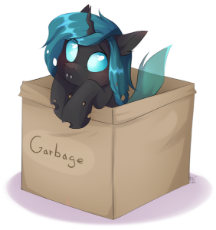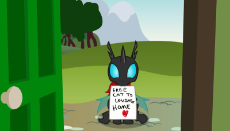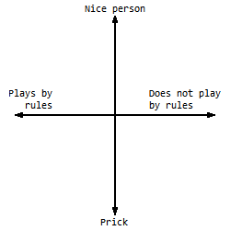The Adventure continues
Six years after season 6, Occupied Equestria presents an alternative history where Chrysalis chose a different approach to her second attack on Equestria. The Changelings have conquered half of Equestria, while a former Equestrian colony - soured to Princess Twilight's notion of harmony with all creatures thank to their dealing with griffins - Invaded and took the other half. In Baltimare and the Equestrian Southeast, the magic of friendship has weakened, as Communists, Changeling infiltrators, Fascists, gangs, and corrupt creepy politicians threaten the city. This role play is based in large part upon the Equestria at War mod for Hearts of Iron 4, and uses D&d 3.5e mechanics.
The Eastside Tavern Gang has broken through the house and pool-house of the politician Comte Burgher. What they found has been nothing short of astonishing. Deeds for properties bought by secret societies, seditious communications, cryptic booklets, concerning academic interests, and above all else, a sex dungeon with two young colts chained up, and traumatized. With these, they found something else: two caged and chained up adolescent Changeling drones. So doing what any logically minded group of people would do when encountering caged life-force vampires, they let the things suck on them, then took them home and hugged them and loved them and squeezed them and called them 'George.'
Dark Star is coming to terms with loss in the Stallion's room of the Eastside tavern, while Iron aids him. Silver dreams of an Equestria that is no more and his long lost family (while sleeping in a fairly awkward position). Ash awaits a new dawn of service, Onyx a new life of possible employment, while Brie and Spark stay in a small room with two strange guests
/vx/ - Videogames and Paranormal
[Read more]
1812 replies and 45 files omitted.
>>88041
"Du warst wie ein Fohlen und zeigst Pflege und Zuneigung. Ich habe sehr wenig von dir gesehen, was bedeuten würde, dass du nicht liebst."
"Du warst wie ein Fohlen und zeigst Pflege und Zuneigung. Ich habe sehr wenig von dir gesehen, was bedeuten würde, dass du nicht liebst."
>>88046
Silver sighs. "So oder so bleibt der Punkt bestehen. Ich kann dich nicht zwingen, einen Weg über den anderen zu wählen. Ich bin mir jedoch nicht sicher, wie glücklich Sie auf lange Sicht hier sind. Ich kann nicht hier bleiben, um jede Stunde des Tages auf dich aufzupassen. Ich habe andere Verpflichtungen, um die ich mich kümmern muss."
Silver sighs. "So oder so bleibt der Punkt bestehen. Ich kann dich nicht zwingen, einen Weg über den anderen zu wählen. Ich bin mir jedoch nicht sicher, wie glücklich Sie auf lange Sicht hier sind. Ich kann nicht hier bleiben, um jede Stunde des Tages auf dich aufzupassen. Ich habe andere Verpflichtungen, um die ich mich kümmern muss."
>>88047
He continues looking at Silver
"Wie gut wird sich die Polizei um mich kümmern? Wird die Polizei mich lieben?"
Kerr interjects:
"Ich verstehe nicht. Sie lassen uns beißen, aber Sie haben die Macht über uns. Halten Sie uns als Sklaven?"
He continues looking at Silver
"Wie gut wird sich die Polizei um mich kümmern? Wird die Polizei mich lieben?"
Kerr interjects:
"Ich verstehe nicht. Sie lassen uns beißen, aber Sie haben die Macht über uns. Halten Sie uns als Sklaven?"
>>88051
Wesley has a look of concern. But for Kerr, however, concern pervades his whole body. He rises to his deformed and holey hooves and speaks with fright and anger
"Du wirst uns töten? Oder vivisect uns?"
Wesley has a look of concern. But for Kerr, however, concern pervades his whole body. He rises to his deformed and holey hooves and speaks with fright and anger
"Du wirst uns töten? Oder vivisect uns?"
>>88052
Silver for his part tries to adopt a stern yet reassuring voice. "Nein, das würde ich nicht zulassen. Ich werde dich nicht zur Polizei machen."
Silver for his part tries to adopt a stern yet reassuring voice. "Nein, das würde ich nicht zulassen. Ich werde dich nicht zur Polizei machen."
Kerr responds "Also wirst du uns töten und nicht die Polizei"
Wesley brushes off Kerr's fear, and reassures him
"Oh bitte, er will nur, dass wir Sex mit ihm haben. Aber er hat Liebe und füttert uns, wenn er uns dazu bringt, es zu tun"
>>88058
"Well, we will have our analysts look at it"
Wesley brushes off Kerr's fear, and reassures him
"Oh bitte, er will nur, dass wir Sex mit ihm haben. Aber er hat Liebe und füttert uns, wenn er uns dazu bringt, es zu tun"
>>88058
"Well, we will have our analysts look at it"
>>88059
Kerr responds to Wesley indignantly:
"Ich werde keine Ponys mehr saugen"
Wesley is annoyed by Kerr's difficulty
"Möchten Sie hungern?"
>"Ich möchte mit ihnen sexuell nichts anfangen"
"Wir befinden uns derzeit nicht in einer Verhandlungsposition"
>"Dann gehen wir dorthin, wo Jäger herrschen"
"Wir können nicht dorthin gehen, ohne uns mit Ponyjägern zu beschäftigen"
Kerr responds to Wesley indignantly:
"Ich werde keine Ponys mehr saugen"
Wesley is annoyed by Kerr's difficulty
"Möchten Sie hungern?"
>"Ich möchte mit ihnen sexuell nichts anfangen"
"Wir befinden uns derzeit nicht in einer Verhandlungsposition"
>"Dann gehen wir dorthin, wo Jäger herrschen"
"Wir können nicht dorthin gehen, ohne uns mit Ponyjägern zu beschäftigen"
My mind is in the completely wrong place to do dialogue effectively.
>>88062
"i started some conversation with him about all the places he has sailed. he said if i ever wanted to talk with him again i should feel free to."
"i started some conversation with him about all the places he has sailed. he said if i ever wanted to talk with him again i should feel free to."
>>88067
"Well, sounds like progress should you ever need to talk to him again. Let's hope that him knowing your face does no harm in the future"
"Well, sounds like progress should you ever need to talk to him again. Let's hope that him knowing your face does no harm in the future"
>>88065
"Nein, ich werde dich nicht verkaufen. Ich werde nichts von diesen schrecklichen Dingen tun."
"Nein, ich werde dich nicht verkaufen. Ich werde nichts von diesen schrecklichen Dingen tun."
>>88071
"it was my pleasure,sir. if you need anything else done let me know. actually sir i had almost forgotten, there's a valuable member of the team i put together, he has done some great things that has helped me accomplish the things that i have. and he mentioned to me the other day that he would love to become a citizen of the state. i would like to help him get his citizenship if possible."
"it was my pleasure,sir. if you need anything else done let me know. actually sir i had almost forgotten, there's a valuable member of the team i put together, he has done some great things that has helped me accomplish the things that i have. and he mentioned to me the other day that he would love to become a citizen of the state. i would like to help him get his citizenship if possible."
>>88074
"He is a Crystal pony, i believe he crossed the border into Equestria after the changelings occupied the crystal empire."
"He is a Crystal pony, i believe he crossed the border into Equestria after the changelings occupied the crystal empire."
>>88075
"I see. Either a Marelito or one of the Reichflüchtling. We are technically supposed to turn those over to the Changeling Hegemony, but suffice it to say that treaty is not often honored"
"I see. Either a Marelito or one of the Reichflüchtling. We are technically supposed to turn those over to the Changeling Hegemony, but suffice it to say that treaty is not often honored"
>>88076
"Forgive me,sir. but im not sure what either of those words mean. he has been given the changeling test and i do not believe he is a spy. and i recall that he may be interested in joining the Party."
"Forgive me,sir. but im not sure what either of those words mean. he has been given the changeling test and i do not believe he is a spy. and i recall that he may be interested in joining the Party."
Brie sits in silence, even the voices in his head seeming to shrug defeatedly at the conversation going on in front of him.
"Uh, I don't suppose you could give me an idea of what is being said," he whispers in Silver's direction, not wanting to interrupt but tangibly curious.
Seriously, I don't suppose we could switch to English for protracted such as this? I promise I'll authentically use broken and incorrect sentence fragments,...
Also, sorry for dying last night
"Uh, I don't suppose you could give me an idea of what is being said," he whispers in Silver's direction, not wanting to interrupt but tangibly curious.
Seriously, I don't suppose we could switch to English for protracted such as this? I promise I'll authentically use broken and incorrect sentence fragments,...
Also, sorry for dying last night
>>87974
What do you think?
Imo, Brie and chaotic-neutral characters in general should probably adopt the worldview of Egoism. It's fascinating.
What do you think?
Imo, Brie and chaotic-neutral characters in general should probably adopt the worldview of Egoism. It's fascinating.
>>88090
This. I think he likes when an ideology is followed to the extreme and chaotic neutrals are a good fit for this particular ideology. Maybe chaotic evil is more fitting than neutral.
This. I think he likes when an ideology is followed to the extreme and chaotic neutrals are a good fit for this particular ideology. Maybe chaotic evil is more fitting than neutral.
>>88091
I am a fan of obscure ideologies, yes. An Egoist does not see good or evil except in relation to him and so would be closer to chaotic neutral, though he would appear chaotic evil to others if his actions tend to harm them.
Seriously though, it's a good read. Something like proto-objectivism.
I am a fan of obscure ideologies, yes. An Egoist does not see good or evil except in relation to him and so would be closer to chaotic neutral, though he would appear chaotic evil to others if his actions tend to harm them.
Seriously though, it's a good read. Something like proto-objectivism.
>>88090
Stirner also wrote that criminals are basically Egoists who don't know it yet, so it would make sense if a thief is one.
Stirner also wrote that criminals are basically Egoists who don't know it yet, so it would make sense if a thief is one.
>>88091
I see the moral alignment compas as a combination of two axis.
Lawfulness means respecting/following rules and traditions. Chaos means doing the opposite, breaking down or defying laws and traditions, but may also entail the liberation of oneself or others.
Goodness is doing what's morally right; upholding righteousness and sanctity for the sake of objective virtue. Evil is embracing wickedness and depravity; being willing to commit unspeakable acts for your own selfish ambitions.
I see the moral alignment compas as a combination of two axis.
Lawfulness means respecting/following rules and traditions. Chaos means doing the opposite, breaking down or defying laws and traditions, but may also entail the liberation of oneself or others.
Goodness is doing what's morally right; upholding righteousness and sanctity for the sake of objective virtue. Evil is embracing wickedness and depravity; being willing to commit unspeakable acts for your own selfish ambitions.
>>88093
Chaotic alignments are pretty common for thieves.
Tbh, something I like about d&d is the simple alignment system. Makes it easier to tell right from wrong, and mortal enemies from potential allies.
There's goodness and evil, law and chaos. Where you stand on that chart effects how NPCs will percieve you, as well as how certain spells affect you.
>Tfw Detect Evil isn't a class spell for Druids
Chaotic alignments are pretty common for thieves.
Tbh, something I like about d&d is the simple alignment system. Makes it easier to tell right from wrong, and mortal enemies from potential allies.
There's goodness and evil, law and chaos. Where you stand on that chart effects how NPCs will percieve you, as well as how certain spells affect you.
>Tfw Detect Evil isn't a class spell for Druids
>>88088
You think so? Thats good, cuz just this morning I was thinking to myself "Hmmmm, I wonder what anon thinks I should do with my character". Thanks.
e_e
You think so? Thats good, cuz just this morning I was thinking to myself "Hmmmm, I wonder what anon thinks I should do with my character". Thanks.
e_e
>>88099
Well, it's not always to tell if creature or group of creatures is good or evil; you can tell by their actions.
If you have skill ranks in certain schools of knowledge, you can take 10 to know the alignments of certain monsters/creatures. That generally tells how easy they are to negotiate with.
Well, it's not always to tell if creature or group of creatures is good or evil; you can tell by their actions.
If you have skill ranks in certain schools of knowledge, you can take 10 to know the alignments of certain monsters/creatures. That generally tells how easy they are to negotiate with.
>>88097
From what I read from Silver's conversation, Wesley was accepting to enact sexual favours for Silver while Kerr, the proud bugboi that he is, rejects this notion. Silver reassures both of them that he will not sex them or other evil-aligned things. Wesley seems dejected by this since he likes Silver more than her hive or the other ponies in Tall Tales. Kerr just wants to go back to being a fighter for the hive or something, not sure if it's correct. What I do know is that stubborn hug attacks are super effective to Kerr while Wesley is basically selling his body to Silver, partially because he likes him.
That's what I gathered from majestic (((Google))) translate.
From what I read from Silver's conversation, Wesley was accepting to enact sexual favours for Silver while Kerr, the proud bugboi that he is, rejects this notion. Silver reassures both of them that he will not sex them or other evil-aligned things. Wesley seems dejected by this since he likes Silver more than her hive or the other ponies in Tall Tales. Kerr just wants to go back to being a fighter for the hive or something, not sure if it's correct. What I do know is that stubborn hug attacks are super effective to Kerr while Wesley is basically selling his body to Silver, partially because he likes him.
That's what I gathered from majestic (((Google))) translate.
>>88107
>>88106
If I'm not mistaken, it's because:
a- The border between New Mareland and Changeling Lands is basically that warzone between North and South Korea, so they should ask the government for deportation.
b- Some of the PCs are a bit reluctant, as well as Wesley and Kerr, to let them be deported to their place willy nilly without a guarantee on the foals' safety, since it could be bad press on the New Mareland people and something to justify bad acts against ponies, leading to possible cover up. Maybe even disposing of the foals if the GM feels like putting some drama.
>>88106
If I'm not mistaken, it's because:
a- The border between New Mareland and Changeling Lands is basically that warzone between North and South Korea, so they should ask the government for deportation.
b- Some of the PCs are a bit reluctant, as well as Wesley and Kerr, to let them be deported to their place willy nilly without a guarantee on the foals' safety, since it could be bad press on the New Mareland people and something to justify bad acts against ponies, leading to possible cover up. Maybe even disposing of the foals if the GM feels like putting some drama.
>>88108
>something to justify bad acts against ponies
Insectoids don't need a reason to attack ponies.
>something to justify bad acts against ponies
Insectoids don't need a reason to attack ponies.
>>88109
From what Skies said, it is needed to inspire another war. I think it's taken from HoI's core mechanic of justifying war goals to the people.
From what Skies said, it is needed to inspire another war. I think it's taken from HoI's core mechanic of justifying war goals to the people.
>>88111
She does, but there would be a lot more deserters if she goes to war without some justification. Let's just say that the fact that a pony willingly abused changeling foals put the ponies in a bad light, inspiring the death and suffering of the ponies by the changelings.
She does, but there would be a lot more deserters if she goes to war without some justification. Let's just say that the fact that a pony willingly abused changeling foals put the ponies in a bad light, inspiring the death and suffering of the ponies by the changelings.
>>88112
The Changelings are energy-draining, predatory parasites. Chrysalis never before expressed any reasoning for why she wanted to attack ponies other than "I'm greedy, and they have what we eat"; they just all followed her with impunity.
Is there some other kind of group of bugs that have a different lifestyle?
The Changelings are energy-draining, predatory parasites. Chrysalis never before expressed any reasoning for why she wanted to attack ponies other than "I'm greedy, and they have what we eat"; they just all followed her with impunity.
Is there some other kind of group of bugs that have a different lifestyle?
>>88114
Yes. On Farbrook there's harmonic changelings.
Basically the changelings are not a literal hivemind and have their own feelings about the changeling-pony war. Like I said, it probably was taken from the mod, not the show.
Yes. On Farbrook there's harmonic changelings.
Basically the changelings are not a literal hivemind and have their own feelings about the changeling-pony war. Like I said, it probably was taken from the mod, not the show.
>>88116
More like the democratic side. It is prone to leading to world peace if you want to look at it as the good side.
More like the democratic side. It is prone to leading to world peace if you want to look at it as the good side.
>>88117
Well, democracy isn't synonymous with good.
I'll just decide my opinion of each creature/faction as I meet them.
Well, democracy isn't synonymous with good.
I'll just decide my opinion of each creature/faction as I meet them.
>>88119
Besides, declaring war on another sovereign state in the name of "democracy" is a glownigger tier move.
Besides, declaring war on another sovereign state in the name of "democracy" is a glownigger tier move.
>>88120
Pretty much this. If you want a bit of reassurance, harmonist states in the game cannot declare war unless there's 50% world tension, meaning they need an unstable enemy to cause it.
Pretty much this. If you want a bit of reassurance, harmonist states in the game cannot declare war unless there's 50% world tension, meaning they need an unstable enemy to cause it.
>>88121
Well, this isn't a war simulation. The story will play out as it does.
I was aiming for political neutrality anyway.
Well, this isn't a war simulation. The story will play out as it does.
I was aiming for political neutrality anyway.
>>88123
Iron would be a bit apolitical as well, since he's a pretty young stallion that is only interested in renown and riches, but could be swayed into fascism if done right.
No, I'm not telling how to make Iron a fascist.
Iron would be a bit apolitical as well, since he's a pretty young stallion that is only interested in renown and riches, but could be swayed into fascism if done right.
No, I'm not telling how to make Iron a fascist.
>>88124
Sister Ash just does what she thinks is right, and protects what's valuable to her.
Alignment > Ideology
Sister Ash just does what she thinks is right, and protects what's valuable to her.
Alignment > Ideology
>>88125
I guess that's true, but ideology is way easier to band with others than alignment.
But yeah, for chaotic characters, alignment is better than ideology.
I guess that's true, but ideology is way easier to band with others than alignment.
But yeah, for chaotic characters, alignment is better than ideology.
>>88126
Well, I'm not exactly keen on spending feat slots leadership related feats.
Besides, being a Druid means having a lack of allegiance to anything but the natural world.
Well, I'm not exactly keen on spending feat slots leadership related feats.
Besides, being a Druid means having a lack of allegiance to anything but the natural world.
1548624863.png (68.4 KB, 468x630, CorneliuCodreanuColorPortrait.png)

>>88129
Yeah.
It's only good if you have high Charisma though, unless you have levels in Marshall, Outlaw, or Dread Pirate. Even so, you take penalties for leading your followers into harm's way.
It can be good for some types of characters, especially Clerics, Bards, Paladins, and Evangelists.
Having followers can help with clearing dungeons though, since you don't have to hire henchmen to carry stuff out, and instead just have to make sure your followers are paid and equipt.
Yeah.
It's only good if you have high Charisma though, unless you have levels in Marshall, Outlaw, or Dread Pirate. Even so, you take penalties for leading your followers into harm's way.
It can be good for some types of characters, especially Clerics, Bards, Paladins, and Evangelists.
Having followers can help with clearing dungeons though, since you don't have to hire henchmen to carry stuff out, and instead just have to make sure your followers are paid and equipt.
>>88132
Nah, ideologies mostly govern how people live within a society. They can vary by circumstance.
Morals are objective. Even gods sit somewhere on the law/chaos axis. It's not difficult to determine a creature's alignment in d&d either, unless they intentionally try to conceal it.
>>88133
The first feat I know is call "Leadership".
Nah, ideologies mostly govern how people live within a society. They can vary by circumstance.
Morals are objective. Even gods sit somewhere on the law/chaos axis. It's not difficult to determine a creature's alignment in d&d either, unless they intentionally try to conceal it.
>>88133
The first feat I know is call "Leadership".
>>88134
I see your point about ideologies. I guess alignment is the better one in terms of individual morality.
>can't take leadership because character is level 5
Aw, I wanted to have followers for my bard.
I see your point about ideologies. I guess alignment is the better one in terms of individual morality.
>can't take leadership because character is level 5
Aw, I wanted to have followers for my bard.
>>88139
Mostly knowledge.
I pretty much have to rank up Knowledge (nature), spellcraft, and concentration each level, or class features will become difficult to use.
Mostly knowledge.
I pretty much have to rank up Knowledge (nature), spellcraft, and concentration each level, or class features will become difficult to use.
>>88114
Look, if you want to learn more about the world, the proper way to find out is to talk to NPCs or read articles within the world. That way, the world unfolds naturally as you explore more of it and get to know it better, rather than everything being handed to you like an encyclopedia article. Second, see point number one becuase that is important. If you are hellbent insistent on playing a character who thinks that willful ignorance of the politics that form the motives and lurking fears of the people around her is the best way of being neutral to these same political machinations, then you probably deserve to remain as ignorant as your character.
But since you are insistent on being spoon-fed an encyclopedia entry rather than just asking an NPC, then fine, here is an encyclopedia entry:
Changelings tend towards hierarchy and collectivism. They are NOT a literal hivemind. This should be obvious from the show. In "The Times They are a Changeling," they met a drone who, well, didn't exactly like traditional Changeling living. And what happened in that episode is cannon in the mod and this story, being set after it. Then in "To Where and Back Again," we see the entire Changeling Hive turn against Chrysalis. Like Ronald Reagan's question to the American People in his 1980 televised debate against Jimmy Carter, Thorax asked the drones of the Changeling Hive "are you better off than you were four years ago?" To which they, like the American People, responded by overthrowing the leader that had lead them to poverty and want. So obviously, in the show the old-style Changelings have the option of disobeying Chrysalis. It's true that not everything about that episode is being followed here, but there is no reason at all that we have to abandon that bit of the show's lore. I see no reason to say "No, the show is wrong, Changelings can never ever under any circumstances at all disobey Chrysalis." Like what would be the point of that?
Compare Changelings to the culture of Germany circa the second empire. If you read the German philosophers of the preceding period: Fichte, Hegel, Feuerbach... You'll see that German political and social philosophy is overwhelmingly colletivistic. Add in Kant, and you see a strong preference for order and obedience in the German nations, a preference that was nearly infamous in other nations. And yet, at the very end of October in 1918, the German Navy mutinied, and then a larger socialist-led revolt overthrew the Kaiser, and forced him to flee the country. The proud, obedient German people (some of them) overthrew their own Kaiser. And I can pretty much promise you that it never would have happened if the nation hadn't been starving to death over the past 4 years, hadn't been fighting stalement for years, hadn't decisively lost the war and 1 million soldiers in the six months before, and all of its allies hadn't capitulated. The Germans did something sort of similar after the even more crushing defeat in WW2 many years later. So yes, even a culture centered on Nationalism and Obedience can be persuaded to overthrow their king, when the answer to the old question "Are you better off than you were 4 years ago?" is a resounding "hell no."
Further, and listen to this as well, its not necessarily a matter of individuals or Changelings as a race, so much as clans within the nation. If we go by the mod, then the Changeling Hives are not a single hive, but well, a number of different ones that used to fight each other. Chrysalis united them. Think of them like Scotland, which consisted of a number of different clans which often commanded more loyalty than "Scotland" as a nation. Or, again, look to Germany around the time of the second empire. Germany had been a very large number of independent states until one particularly aggressive nation conquered, annexed, or forced into coalition all the rest. After this, it wasn't perfect harmony, but there were occasional disagreements between the people of the different states. British Soldiers in the trenches of WW1 tell about how German regiments from Saxony and Bavaria tended to be fairly docile compared to the very aggressive Prussians. And maybe the same would be true of Chrysalis's Changeling Empire, some hives being like Bavarians or Saxons. While these hives would be more loyal than not, neither will they follow Chrysalis to ruin, starvation and death.
Justifying a war is not just about preventing revolt from fighting. It's about persuading the members to give it their all in running through artillery barrages, or in committing to make 10 shells before lunch rather than only 6 shells. It's also about getting the populace to accept the terms of the peace rather than thinking it too harsh or too light, when it comes. Remember that what Chrysalis is doing in this scenario is different from what she does in the comics. She is not simply raiding a country for its love. She is colonizing it. That makes peace as difficult as war.
And finally - please for the love of God don't dismiss this off hand - justifications for war are not just for their own country's citizens. They are for the citizens and leaders of other nations. Chrysalis has to justify to uneasy and untrusting outsiders where she will invade, and where she will stop. Saying "I am going into East Equestria because the area is so lawless as to not even be able to stop its own citizens from kidnapping and raping ours" doesn't necessarily persuade other countries that Chrysalis has a right, but it just might make them less confident in New Mareland's claim, and thus less willing to help New Mareland - all the same for Chrysalis as it is a victory for her. Even a bad argument for why an invasion takes place where you already agreed to give up territory is an argument. It gives opponent's of the Hegemony's enemies a weapon to use against them.
And so on and so forth. If none of this is persuasive, I don't care. Deal with it in character and stop spamming with meta talk
[Read more] Look, if you want to learn more about the world, the proper way to find out is to talk to NPCs or read articles within the world. That way, the world unfolds naturally as you explore more of it and get to know it better, rather than everything being handed to you like an encyclopedia article. Second, see point number one becuase that is important. If you are hellbent insistent on playing a character who thinks that willful ignorance of the politics that form the motives and lurking fears of the people around her is the best way of being neutral to these same political machinations, then you probably deserve to remain as ignorant as your character.
But since you are insistent on being spoon-fed an encyclopedia entry rather than just asking an NPC, then fine, here is an encyclopedia entry:
Changelings tend towards hierarchy and collectivism. They are NOT a literal hivemind. This should be obvious from the show. In "The Times They are a Changeling," they met a drone who, well, didn't exactly like traditional Changeling living. And what happened in that episode is cannon in the mod and this story, being set after it. Then in "To Where and Back Again," we see the entire Changeling Hive turn against Chrysalis. Like Ronald Reagan's question to the American People in his 1980 televised debate against Jimmy Carter, Thorax asked the drones of the Changeling Hive "are you better off than you were four years ago?" To which they, like the American People, responded by overthrowing the leader that had lead them to poverty and want. So obviously, in the show the old-style Changelings have the option of disobeying Chrysalis. It's true that not everything about that episode is being followed here, but there is no reason at all that we have to abandon that bit of the show's lore. I see no reason to say "No, the show is wrong, Changelings can never ever under any circumstances at all disobey Chrysalis." Like what would be the point of that?
Compare Changelings to the culture of Germany circa the second empire. If you read the German philosophers of the preceding period: Fichte, Hegel, Feuerbach... You'll see that German political and social philosophy is overwhelmingly colletivistic. Add in Kant, and you see a strong preference for order and obedience in the German nations, a preference that was nearly infamous in other nations. And yet, at the very end of October in 1918, the German Navy mutinied, and then a larger socialist-led revolt overthrew the Kaiser, and forced him to flee the country. The proud, obedient German people (some of them) overthrew their own Kaiser. And I can pretty much promise you that it never would have happened if the nation hadn't been starving to death over the past 4 years, hadn't been fighting stalement for years, hadn't decisively lost the war and 1 million soldiers in the six months before, and all of its allies hadn't capitulated. The Germans did something sort of similar after the even more crushing defeat in WW2 many years later. So yes, even a culture centered on Nationalism and Obedience can be persuaded to overthrow their king, when the answer to the old question "Are you better off than you were 4 years ago?" is a resounding "hell no."
Further, and listen to this as well, its not necessarily a matter of individuals or Changelings as a race, so much as clans within the nation. If we go by the mod, then the Changeling Hives are not a single hive, but well, a number of different ones that used to fight each other. Chrysalis united them. Think of them like Scotland, which consisted of a number of different clans which often commanded more loyalty than "Scotland" as a nation. Or, again, look to Germany around the time of the second empire. Germany had been a very large number of independent states until one particularly aggressive nation conquered, annexed, or forced into coalition all the rest. After this, it wasn't perfect harmony, but there were occasional disagreements between the people of the different states. British Soldiers in the trenches of WW1 tell about how German regiments from Saxony and Bavaria tended to be fairly docile compared to the very aggressive Prussians. And maybe the same would be true of Chrysalis's Changeling Empire, some hives being like Bavarians or Saxons. While these hives would be more loyal than not, neither will they follow Chrysalis to ruin, starvation and death.
Justifying a war is not just about preventing revolt from fighting. It's about persuading the members to give it their all in running through artillery barrages, or in committing to make 10 shells before lunch rather than only 6 shells. It's also about getting the populace to accept the terms of the peace rather than thinking it too harsh or too light, when it comes. Remember that what Chrysalis is doing in this scenario is different from what she does in the comics. She is not simply raiding a country for its love. She is colonizing it. That makes peace as difficult as war.
And finally - please for the love of God don't dismiss this off hand - justifications for war are not just for their own country's citizens. They are for the citizens and leaders of other nations. Chrysalis has to justify to uneasy and untrusting outsiders where she will invade, and where she will stop. Saying "I am going into East Equestria because the area is so lawless as to not even be able to stop its own citizens from kidnapping and raping ours" doesn't necessarily persuade other countries that Chrysalis has a right, but it just might make them less confident in New Mareland's claim, and thus less willing to help New Mareland - all the same for Chrysalis as it is a victory for her. Even a bad argument for why an invasion takes place where you already agreed to give up territory is an argument. It gives opponent's of the Hegemony's enemies a weapon to use against them.
And so on and so forth. If none of this is persuasive, I don't care. Deal with it in character and stop spamming with meta talk
>>88142
Ah. I never knew that justification of war is for other countries except your own. Good to know.
Ah. I never knew that justification of war is for other countries except your own. Good to know.
>>88142
>willful ignorance of the politics
That's not what I meant at all.
What I mean is that my character is simply unaligned, as far as political factions go. She's not loyal to any major entity.
As for apparent ignorance, I don't have any relevant knowledge rank as a class skill, so I'm playing her as an uninformed foreigner.
>willful ignorance of the politics
That's not what I meant at all.
What I mean is that my character is simply unaligned, as far as political factions go. She's not loyal to any major entity.
As for apparent ignorance, I don't have any relevant knowledge rank as a class skill, so I'm playing her as an uninformed foreigner.
Sorry, I've been around doing stuff. So where are we at?
Is this >>88105 a reasonably accurate breakdown of the conversation? Did I miss parts? he says after skipping the last 40 posts Are we discussing their fate yer?
Is this >>88105 a reasonably accurate breakdown of the conversation? Did I miss parts? he says after skipping the last 40 posts Are we discussing their fate yer?
>>88146
Silver tried to, but the changelings got too worried about their possible future, stopping the conversation for what I said in the post you linked.
Silver tried to, but the changelings got too worried about their possible future, stopping the conversation for what I said in the post you linked.
>>88153
You're right. So you're basically stuck outside the conversation still then, unless you want to pull out your voices acting as translators.
You're right. So you're basically stuck outside the conversation still then, unless you want to pull out your voices acting as translators.
>>88153
My character just met up with Iron at the orphanage. She's currently moving to talk with Sister Marey about a book that Iron found.
My character just met up with Iron at the orphanage. She's currently moving to talk with Sister Marey about a book that Iron found.
1548628379.png (157.0 KB, 565x600, 0AB5D570-EA81-4EAE-B644-7046020041FD.png)

>>88153
You’ll figure something out. You don’t necessary have to discuss the fate of the Changelings with the hatchlings themselves
You’ll figure something out. You don’t necessary have to discuss the fate of the Changelings with the hatchlings themselves
>>88156
Their opinion is important. I won't say that it is the most important element, but its important dammit
Their opinion is important. I won't say that it is the most important element, but its important dammit
>>88157
>>88157
Here’s something for you to read while you wait on the translator:
https://en.m.wikipedia.org/wiki/Entomophagy
>>88157
Here’s something for you to read while you wait on the translator:
https://en.m.wikipedia.org/wiki/Entomophagy
>>88164
Perhaps this will be a bit more informational
[YouTube] how to cook locusts - honey crunch locust - (cooking insects at home)![]()
Perhaps this will be a bit more informational
[YouTube] how to cook locusts - honey crunch locust - (cooking insects at home)
>>88165
You got so caught up in whether or not you could, you never stopped to figured out whether you should.
Seriously, "Oh, that one time you cooked locusts, that was the BEST" said no one ever
You got so caught up in whether or not you could, you never stopped to figured out whether you should.
Seriously, "Oh, that one time you cooked locusts, that was the BEST" said no one ever
1548632010.png (77.4 KB, 800x457, 876DA9B5-0E21-4711-B121-F9DC606A85D9.png)

>>88166
I mean... It’s Cambodia. So it’s a remarkable improvement over their nutritional situation in the 70s
Whatelse are you going to with giant parasitic wasps?
I mean... It’s Cambodia. So it’s a remarkable improvement over their nutritional situation in the 70s
Whatelse are you going to with giant parasitic wasps?
>>88177
"Well, it was rather boring. I woke up, did some training at the gardens until a mare came by and asked me to remove some dead trees from the area. Said they were blighted, and the orange trees looked like they were dead already." Iron pokes his chin. "That is where I found the book for some reason. I wonder if the book caused the blight."
"Well, it was rather boring. I woke up, did some training at the gardens until a mare came by and asked me to remove some dead trees from the area. Said they were blighted, and the orange trees looked like they were dead already." Iron pokes his chin. "That is where I found the book for some reason. I wonder if the book caused the blight."
>>88178
*Ear twitches*
"Blight, you say..." She replies, looking rather confused.
".. That's odd.. I didn't notice anything last I checked. I must be out of practice.."
*Ear twitches*
"Blight, you say..." She replies, looking rather confused.
".. That's odd.. I didn't notice anything last I checked. I must be out of practice.."
>>88179
Iron shrugs. "There were just four blighted trees. You would have needed to have an extreme sense of blight detection to find four of them in a garden of that size." He smiles sheepishly. "Not that I doubt your abilities, of course."
Iron shrugs. "There were just four blighted trees. You would have needed to have an extreme sense of blight detection to find four of them in a garden of that size." He smiles sheepishly. "Not that I doubt your abilities, of course."
>>88183
Iron strokes her mane some more in an attempt to comfort her. "Do not beat yourself up over it. Nopony can be all knowing all the time."
Iron strokes her mane some more in an attempt to comfort her. "Do not beat yourself up over it. Nopony can be all knowing all the time."
>>88186
"The stumps are still there if you want to take a look, but not before you eat and talk to Marey and the filly. Do not worry, they will not dig up the stumps until tomorrow if I am not mistaken." Iron keeps up his mane stroking as they walk towards the building.
"The stumps are still there if you want to take a look, but not before you eat and talk to Marey and the filly. Do not worry, they will not dig up the stumps until tomorrow if I am not mistaken." Iron keeps up his mane stroking as they walk towards the building.
>>88192
Iron takes out her stroking hoof and opts for a scratch on his side. "Why? Do you worry about physical health?"
Iron takes out her stroking hoof and opts for a scratch on his side. "Why? Do you worry about physical health?"
>>88194
Cuz it was supposed to be part of the feat I wanted. Plus, extreme fasting was supposed to be a suggested aspect for exalted characters.
"Oh, it's just part of my training. I could try to explain it, but quite frankly I don't think you'd understand.." she says, a not abashed
"It's just a thing spiritualists do every now and then where we come from. It's to prove that we can, more than anything."
>>88195
It's only been two days since she's eaten, and I can go 3 before I need to make any starvation checks.
Cuz it was supposed to be part of the feat I wanted. Plus, extreme fasting was supposed to be a suggested aspect for exalted characters.
"Oh, it's just part of my training. I could try to explain it, but quite frankly I don't think you'd understand.." she says, a not abashed
"It's just a thing spiritualists do every now and then where we come from. It's to prove that we can, more than anything."
>>88195
It's only been two days since she's eaten, and I can go 3 before I need to make any starvation checks.
1548635562.jpg (21.1 KB, 500x362, DFF3D26C-D6A4-49C6-B01C-DF29BB509789.jpeg)

>>88199
Iron is a bit confused. "Alright then. I suppose it is a show of endurance. I think my brother does that too, if I recall correctly." He shrugs. "As long as you do not faint like yesterday, I am fine with it. Now, let us focus on talking to Marey and the filly." He looks at the abbey's entrance.
>>88201
She ate a mango at day 2 and has not eaten since. That proves Ash's claim
Iron is a bit confused. "Alright then. I suppose it is a show of endurance. I think my brother does that too, if I recall correctly." He shrugs. "As long as you do not faint like yesterday, I am fine with it. Now, let us focus on talking to Marey and the filly." He looks at the abbey's entrance.
>>88201
She ate a mango at day 2 and has not eaten since. That proves Ash's claim
>>88201
She wasn't. She's just eating at increasingly wide intervals as part of her ascetiscism training.
She wasn't. She's just eating at increasingly wide intervals as part of her ascetiscism training.
>>88214
"Hello. My friend Iron here told me about a peculiar book he found in a tree. I thought I should have a look at it; I'm rather quick to recognize these sorts of things."
"Hello. My friend Iron here told me about a peculiar book he found in a tree. I thought I should have a look at it; I'm rather quick to recognize these sorts of things."
>>88218
Sister Ash levitates the book and begins flipping through the pages for a few minutes.
Does she recognize any of the text?
Sister Ash levitates the book and begins flipping through the pages for a few minutes.
Does she recognize any of the text?
>>88222
Sister Ash casts Read Magick as she flips through the text, her eyes magically translating the unintelligible script.
Sister Ash casts Read Magick as she flips through the text, her eyes magically translating the unintelligible script.
>>88222
The spell translates the script and reveals any hidden magic.
It lasts 10 minutes per level (50 mins), and allows her to read 250 words per minute.
The spell translates the script and reveals any hidden magic.
It lasts 10 minutes per level (50 mins), and allows her to read 250 words per minute.
>>88227
Well, it works for regular text too.
Sister Ash is reading it for the sake of determining it's origins, and checking for any curses that might be unleashed if she destroys it.
Well, it works for regular text too.
Sister Ash is reading it for the sake of determining it's origins, and checking for any curses that might be unleashed if she destroys it.
Portions of it translate, which seem to be incantations
"Per Boreas, Marr, Arcturius, Disord, Ukko, Pellegro, the pythonic word, the mystery of the salamander, the assembly of sylphs, the grotto of gnomes, the demons of the tartarus, of Tirek, Katrina, Grogar, Beezen, the Smooze, and Lavan Come, Come, Come!"
Portions of it are dense in Black Language, presumably what Abby was speaking two night ago, some of it are in some foreign language that is not so alien as to not be off the planet, and some of it is in Ponish.
"Per Boreas, Marr, Arcturius, Disord, Ukko, Pellegro, the pythonic word, the mystery of the salamander, the assembly of sylphs, the grotto of gnomes, the demons of the tartarus, of Tirek, Katrina, Grogar, Beezen, the Smooze, and Lavan Come, Come, Come!"
Portions of it are dense in Black Language, presumably what Abby was speaking two night ago, some of it are in some foreign language that is not so alien as to not be off the planet, and some of it is in Ponish.
>>88231
"~Into the burn pile it goes!" Sister Ash announces amatteroffactly, as she closes the book.
I'm slightly interested in Sylphs though..
"~Into the burn pile it goes!" Sister Ash announces amatteroffactly, as she closes the book.
I'm slightly interested in Sylphs though..
>>88233
"It seems to be a warlocks' tomb, if I had to compare it to anything else I've seen.. Something written by an occultist, spiritually interested in contacting spirits from other planes."
Her eyes narrow as she peers into the text
"... There's quite a bit in here.. but most of its mentions are decisively evil. It's not unlike the text that was confiscated from Abby not too long ago..." She continues
"It seems to be a warlocks' tomb, if I had to compare it to anything else I've seen.. Something written by an occultist, spiritually interested in contacting spirits from other planes."
Her eyes narrow as she peers into the text
"... There's quite a bit in here.. but most of its mentions are decisively evil. It's not unlike the text that was confiscated from Abby not too long ago..." She continues
>>88234
"Ich wagte mich von der Kolonie weg und in der Nähe des Hafens. Ich war neugierig. Jemand, von dem ich dachte, er sei eine Drohne in Ponyform, fragte mich, ob ich ein Motorboot sehen wollte und wie es funktionierte. Er sagte mir, ich solle ein paar Papiere unterschreiben, damit mich sein Besitzer zuerst in der Nähe des Bootes ließe. Also tat ich es und ging zum Boot. Aber als ich an Bord des Bootes kletterte, packten sie mich in einen Sack. Sie banden mich in Seilen. Ich konnte mich nicht ändern, um rauszukommen. Sie brachten mich mit meinem Bruder zu einem Schiff und brachten mich hierher."
>>88236
Oh no, this book is much more evil than the one taken before
"Ich wagte mich von der Kolonie weg und in der Nähe des Hafens. Ich war neugierig. Jemand, von dem ich dachte, er sei eine Drohne in Ponyform, fragte mich, ob ich ein Motorboot sehen wollte und wie es funktionierte. Er sagte mir, ich solle ein paar Papiere unterschreiben, damit mich sein Besitzer zuerst in der Nähe des Bootes ließe. Also tat ich es und ging zum Boot. Aber als ich an Bord des Bootes kletterte, packten sie mich in einen Sack. Sie banden mich in Seilen. Ich konnte mich nicht ändern, um rauszukommen. Sie brachten mich mit meinem Bruder zu einem Schiff und brachten mich hierher."
>>88236
Oh no, this book is much more evil than the one taken before
>>88236
".... I don't see any obvious spells hidden in here.. but it's exactly the kind of inscription that would be worth destroying: a book that instructs magi to seek out power through evil." She says, deciseivly
>>88237
"I took a tomb from Abby's room just a couple nights ago. That one did have a spell hidden in it. This one, however, is worse than mere magick.. It's misguidance."
".... I don't see any obvious spells hidden in here.. but it's exactly the kind of inscription that would be worth destroying: a book that instructs magi to seek out power through evil." She says, deciseivly
>>88237
"I took a tomb from Abby's room just a couple nights ago. That one did have a spell hidden in it. This one, however, is worse than mere magick.. It's misguidance."
>>88248
Silver drapes a foreleg around Wesley, and pulls him into a hug. "Ich bin nur froh, dass Sie und Ihr Bruder jetzt draußen sind."
Silver drapes a foreleg around Wesley, and pulls him into a hug. "Ich bin nur froh, dass Sie und Ihr Bruder jetzt draußen sind."
>>88251
Iron follows her. "Be careful with showing your... firepony side. The foals may be frightened by the visage."
Iron follows her. "Be careful with showing your... firepony side. The foals may be frightened by the visage."
>>88252
Sister Ash doesn't appear to be angry at the moment. She just tosses the book on to the bonfire with the logs and watches intently as the flames slowly eat it away.
Sister Ash doesn't appear to be angry at the moment. She just tosses the book on to the bonfire with the logs and watches intently as the flames slowly eat it away.
>>88253
"Oh, I guess that works too." Iron is a bit uncomfortable by his suggestion, looking to the side.
"Oh, I guess that works too." Iron is a bit uncomfortable by his suggestion, looking to the side.
[Reply] [Last 50 Posts] [Last 100 Posts] [Last 200 Posts]
You are viewing older replies. Click [View All] or [Last n Posts] to vew latest posts.
Clicking update will load all posts posted after last post on this page.
Post pagination: [Prev] [1-200] [201-400] [401-600] [601-800] [801-1000] [1001-1200] [1201-1400] [1401-1600] [1601-1800] [1801-2000] [2001-2012] [Next] [Live (last 200 replies)]
2012 replies | 55 files | 36 UUIDs | Page 28
[Add to Thread Watcher]




 Ex: Type :littlepip: to add Littlepip
Ex: Type :littlepip: to add Littlepip  Ex: Type :eqg-rarity: to add EqG Rarity
Ex: Type :eqg-rarity: to add EqG Rarity 